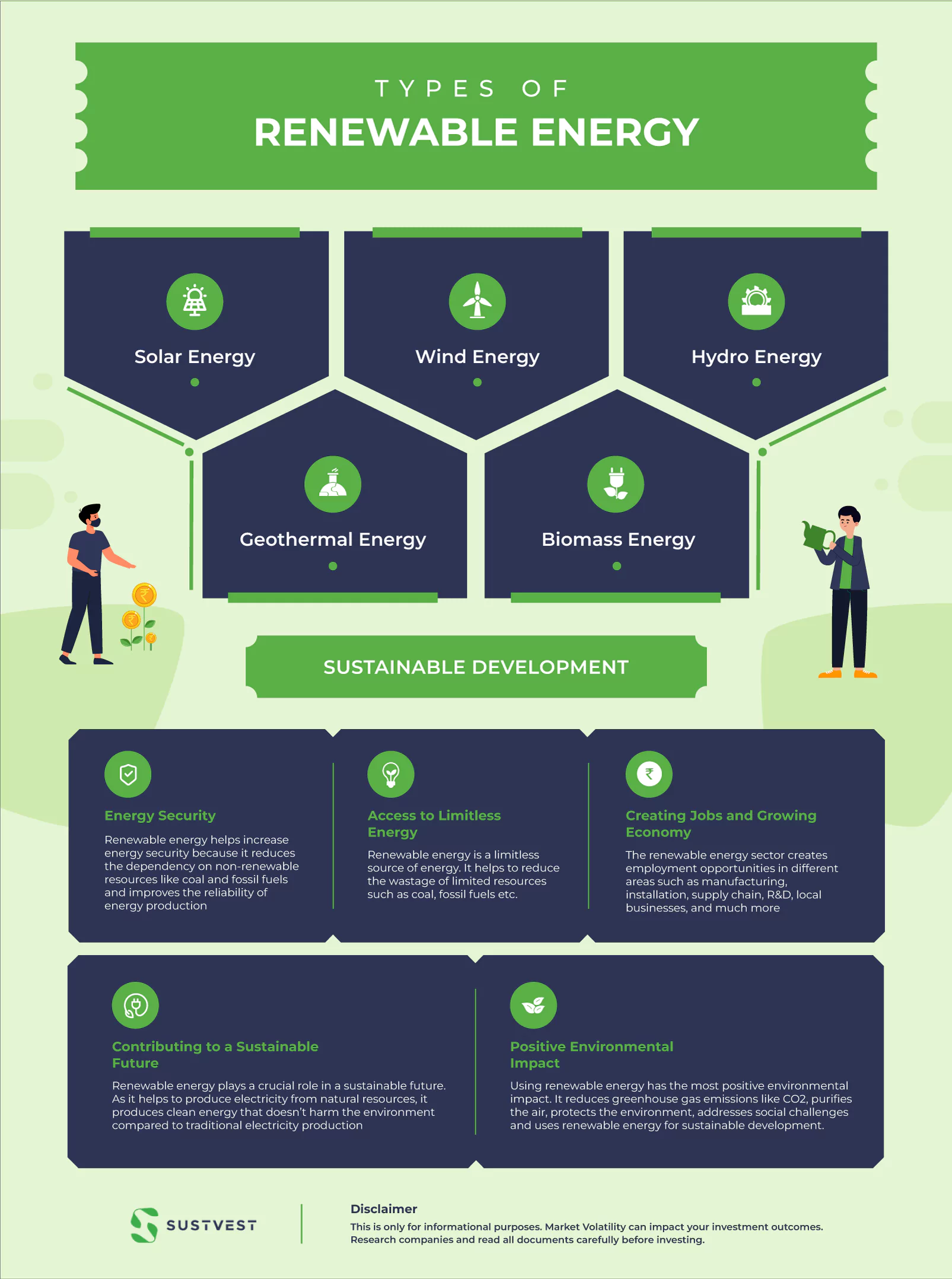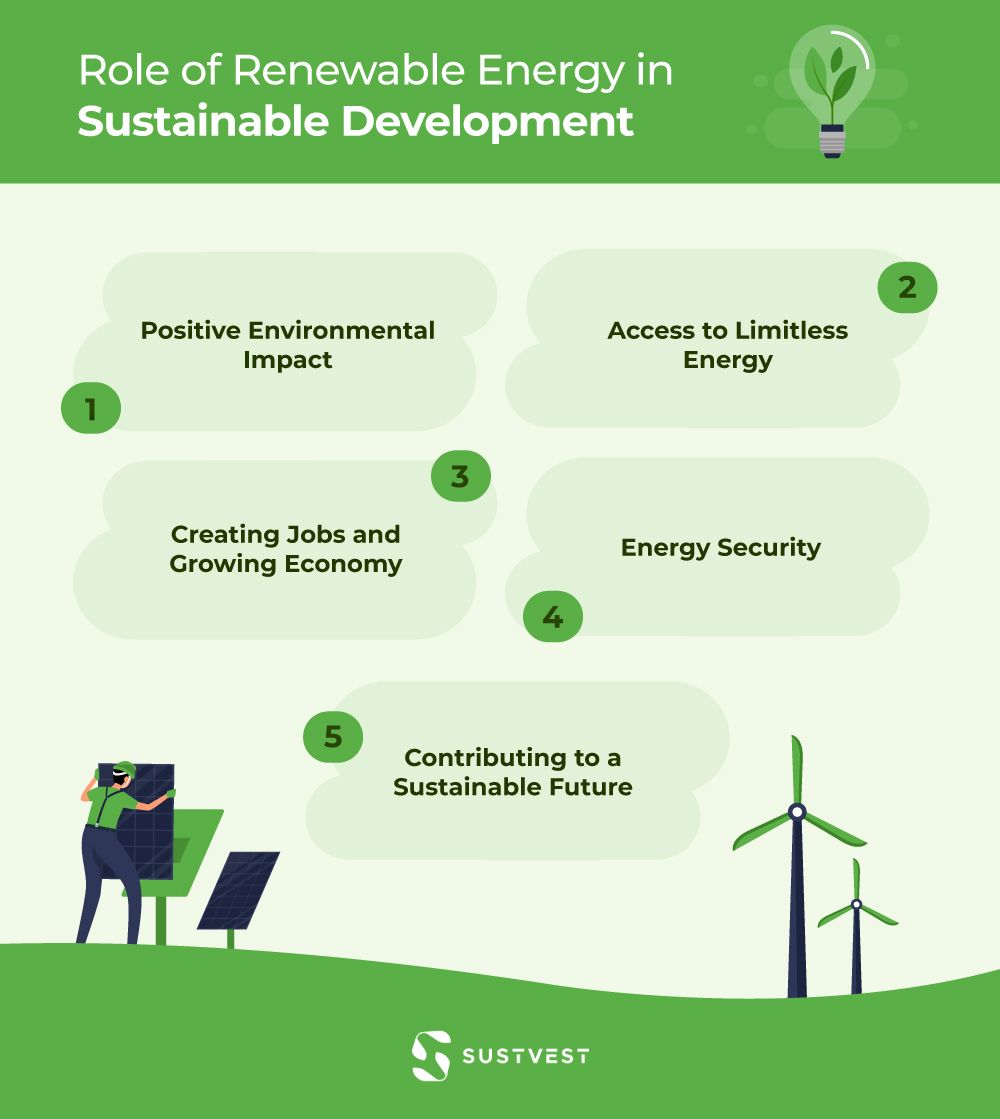In today’s quest for manageable progress, renewable power emerges as a pivotal solution. As global energy demands surge, the adoption of solar, wind, and water energies promises to mitigate climate change, air pollution, and resource depletion.
India, ranking third in green energy production, aims for an impressive GW capacity by 2030, underscoring renewables’ crucial role in shaping our economically viable energy future. This underscores the government’s dedication to clean energy and sustainable development. The rapid growth of the renewable energy sector attracts diverse investors seeking higher returns and long-term profitability.
At SustVest, we focus on high-return investment avenues such as renewable energy, providing thorough guidance for informed investment choices. Join us in exploring how renewable energy drives sustainable development, playing a critical role in shaping a cleaner and more sustainable future.

Renewable Energy: Overview
Renewable energy is generated from natural resources such as sun, wind, water and geothermal heat. These are unlimited energy sources that can continuously produce electricity faster and far better than traditional electricity production, which requires the waste of limited resources such as coal, fossil fuels etc.
It’s a clean energy that reduces carbon emissions and doesn’t harm the environment. Such a transition towards renewable energy for sustainable development comes with a positive impact on the economy.
According to the International Energy Agency (IEA), the global renewable energy supply will increase from 28.7% in 2021 to 43% in 2030.
At Present, India is contributing 4.43% to global renewable energy by generating 168.96 GW. However, the government aimed to reach 500 GW by 2030 and zero net emissions by 2070.
India has a huge potential for renewable energy as it’s full of natural resources and geographical locations that lead to renewable energy for sustainable development.
There are various initiatives the government has launched to promote or spread awareness towards investing in renewable energy, such as tax incentives, incentives, and subsidies on renewable energy products like solar panels, wind turbines and other projects so that people can quickly adapt to renewable energy for sustainable development.
The biggest reason governments are taking various initiatives towards renewable energy is that it’s environmentally friendly, reduces the wastage of limited resources, protects the environment from social challenges, and is an unlimited energy source without using any other resources.
Read here to know: Renewable Energy Investment Returns: Financial Benefits
Types of Renewable Energy

There are various types of renewable energy sources that generate energy. Here are some of the major renewable energy sources:
1. Solar Energy
Sun is a limitless energy source, and it’s the most efficient way to generate renewable energy because the sun’s rays spread to the entire planet, so it’s easier to spread renewable energy than traditional electricity production. Using solar energy sustainable development products such as solar panels, these sun rays collect at the panels and convert them into electricity.
2. Wind Energy
Another popular source of renewable energy is wind. By using wind turbines attached to motors, electricity is generated when turbines rotate, and it generates large amounts to fulfill the world’s energy needs.
3. Hydro Energy
Water is another great way to generate electricity. All the rivers, dams, streams and oceans can generate hydro energy by using a turbine and a generator that catches the water flow and rotates turbines to generate electricity that leads to renewable energy for sustainable development.
4. Geothermal Energy
This type of electricity comes from the earth’s heat surface, which is found around those areas where volcanic activities are found. By setting up geothermal power plants, heat from the earth’s surface turns into electricity via generators. However, these geothermal locations are very limited but have high chances of availability in India.
5. Biomass Energy
Biomass energy comes from plants, woods and wastage. It’s a process of burning waste and turning it into heat that converts it into clean electricity.
These five major types of renewable energy sources produce clean energy and are the best-fit replacement for traditional electricity production.
Find Out: Why Make an Investment in Renewable Energy in India?
Role of Renewable Energy in Sustainable Development

Renewable energy plays a crucial role in sustainable development in various sectors. Let’s explore some major roles of renewable energy for sustainable development:
1. Positive Environmental Impact
Using renewable energy has the most positive environmental impact. It reduces greenhouse gas emissions like CO2, purifies the air, protects the environment, addresses social challenges and uses renewable energy for sustainable development.
2. Access to Limitless Energy
Renewable energy is a limitless source of energy. It helps to reduce the wastage of limited resources such as coal, fossil fuels etc., to produce traditional electricity instead of using natural resources such as sun, water, wind and heat to generate clean electricity. It decreases the dependency on non-renewable resources and produces renewable energy for sustainable development.
3. Creating Jobs and Growing Economy
The renewable energy sector creates employment opportunities in different areas such as manufacturing, installation, supply chain, R&D, local businesses, and much more. The government has taken various initiatives towards promoting renewable energy, such as solar energy, wind turbines, geothermal energy plants and much more, leading to more employment generation and a sustainable future.
4. Energy Security
Renewable energy helps increase energy security because it reduces the dependency on non-renewable resources like coal and fossil fuels and improves the reliability of energy production. As renewable energy comes from natural sources such as sun, wind, water and heat, these are limitless sources of energy that lead to enhanced energy security without any dependency.
5. Contributing to a Sustainable Future
Renewable energy plays a crucial role in a sustainable future. As it helps to produce electricity from natural resources, it produces clean energy that doesn’t harm the environment compared to traditional electricity production, where non-renewable resources are used to produce electricity and release harmful gases into the air. Also, it’s a limitless energy source; it helps provide access to rural areas that, overall, leads to economic growth.
Check out: Harnessing the Power of Renewable Energy in the Future
FAQs:
What is the sustainability of renewable energy?
When energy production is enough to fulfill society’s short-term and long-term needs, then it’s renewable energy for sustainable development.
What are the major renewable energy sources for sustainable development?
Some major renewable energy sources are solar, wind, geothermal, hydroelectric and biomass.
What is the key difference between renewable energy and sustainable energy?
Renewable energy is a type of energy that can be created and replenished constantly. On the other hand, Sustainable development energy comes from sources that can’t be replenished.
What is the importance of sustainable energy?
Here are some pointers to highlight the importance of sustainable development:
- Environmental Impact: Reduces greenhouse gas emissions and mitigates climate change.
- Resource Conservation: Relies on renewable sources, conserving finite natural resources.
- Economic Development: Stimulates innovation, job creation, and economic growth.
- Health Benefits: Improves air and water quality, reducing pollution-related health issues.
Conclusion
Renewable energy is not just an alternative option for electricity; it’s the future of electricity production and contributes greatly to a sustainable future. Adapting renewable energy has numerous benefits, including social, environmental, and economic growth. The government, big organizations, and investors are investing heavily in the renewable energy sector to make that shift and go with renewable energy for sustainable development.
If you’re looking for a safe investment option with higher returns and passive income, then renewable energy is a growing sector that gives you long-term profitability along with a contribution to a sustainable future.
Contact SustVest to start your investment journey and make informed investment decisions that get you passive income, higher returns and long-term profitability.

Founder of Sustvest
Hardik completed his B.Tech from BITS Pilani. Keeping the current global scenario, the growth of renewable energy in mind, and people looking for investment opportunities in mind he founded SustVest ( formerly, Solar Grid X ) in 2018. This venture led him to achieve the ‘Emerging Fintech Talent of the Year in MENA region ‘ in October 2019.




